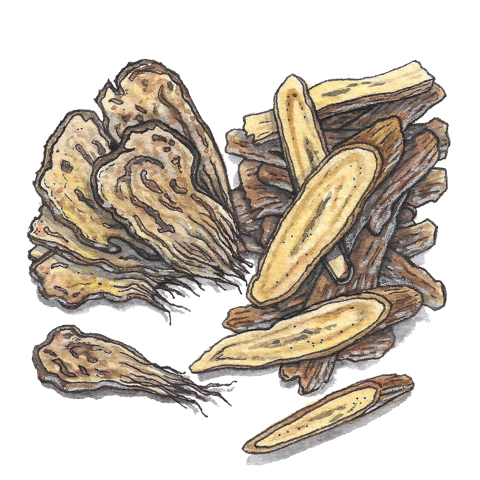
Common Names
- Dang Gui Buxue Tang
- Danggui Buxue Decoction
- Tangkuei decoction
- Danggui buxue san
For Patients & Caregivers
Tell your healthcare providers about any dietary supplements you’re taking, such as herbs, vitamins, minerals, and natural or home remedies. This will help them manage your care and keep you safe.
Dang Gui Bu Xue Tang is a traditional Chinese medicine (TCM) formula. It’s made up of two different herbs.
Dang Gui Bu Xue Tang is used to:
- Increase strength and stamina
- Boost immunity
- Treat symptoms of menopause (permanent end of menstrual cycles) such as hot flashes
Talk with your healthcare providers before taking herbal formulas. They can interact with some medications and affect how they work. For more information, read the “What else do I need to know?” section below.
Side effects have not been reported.
- Avoid DGBXT if you’re pregnant or breastfeeding. It may not be safe for you.
- Talk to your healthcare provider if you have a hormone-sensitive cancer (like some breast or prostate cancers). DGBXT may not be safe for you.
For Healthcare Professionals
Dang Gui Bu Xue Tang (DGBXT) is a traditional Chinese medicine (TCM) formula consisting of two herbs: Astragali Radix and Angelicae Sinensis Radx. Described in the TCM Treatise Neiwaishang Bianhuo Lun, DGBXT has been used to boost energy and immunity, and control menopausal symptoms.
Limited data suggest benefits of this formula for controlling vasomotor symptoms in postmenopausal women (1) (2) , renal anemia in patients with chronic kidney disease (3), retinal hemorrhage in those with diabetic retinopathy (4), and postoperative bleeding following femur fracture (5).
Preliminary findings also show that DGBXT may improve immune function in non-small cell lung cancer patients receiving chemotherapy (6), and prevent chemo-induced thrombocytopenia (13). But it did not prevent chemo-induced myelosuppression in those with breast cancer (7).
Larger studies are needed to expand the evidence surrounding DGBXT.
- Strength and stamina
- Immunostimulation
- Menopausal symptoms
Animal models show that DGBXT stimulates the immune system by increasing cytotoxic T lymphocytes and natural killer cells, and down-regulating activated T helper cells (CD4+/CD25+) in the spleen and tumor-draining lymph nodes (8). It also helped treat anemia by promoting iron ion binding and hemopoietic activities, reducing inflammation and production of reactive oxygen species, as well as blocking apoptosis (9). In streptozotocin-diabetic rats, DGBXT alleviated renal alterations and slowed progression of diabetic nephropathy likely by suppressing transforming growth factor-beta (1) mRNA expression (10).
Additionally, DGBXT may protect against myocardial ischemia injury via mitogen-activated protein kinase/nuclear factor kappa-B pathway (11); and chemo-induced cardiotoxicity through various mechanisms including reducing inflammation, alleviating endoplasmic reticulum stress and regulating apoptosis and autophagy (12).
- Pregnant and breastfeeding women should avoid DGBXT.
- Patients with hormone-sensitive cancers should consult with their physicians before using this formula.
Adverse effects have not been reported.